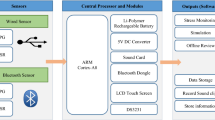Abstract
This work presents a hardware and software solution that implements algorithms based on intelligent computing techniques for estimating the stress level using low cost platforms. These algorithms process the acquired physiological signals directly from the sensors using advanced filtering and processing techniques and algorithms based on fuzzy logic. For this purpose, a hardware configuration based on the Arduino Uno and Raspberry Pi 3 platforms has been chosen. These platforms perform the acquisition, processing and upload of the data to a server via WiFi. In the implementation of the server a configuration based on Linux, Apache, MySQL and PHP (LAMP) has been carried out. The parameters used to estimate the stress level derive from the following physiological signals: the electrocardiogram (ECG) and the galvanic skin response (GSR).
Access this chapter
Tax calculation will be finalised at checkout
Purchases are for personal use only
Similar content being viewed by others
References
Monton, E., et al.: Body area network for wireless patient monitoring. IET Commun. 2(2), 215–222 (2008)
Jovanov, E., et al.: Stress monitoring using a distributed wireless intelligent sensor system. IEEE Eng. Med. Biol. Mag. 22(3), 49–55 (2003)
Park, S., Jayaraman, S.: Enhancing the quality of life through wearable technology. IEEE Eng. Med. Biol. Mag. 22(3), 41–48 (2003)
Zalabarria, U., et al.: Detection of stress level and phases by advanced physiological signal processing based on fuzzy logic. In: International Conference on European Transnational Education, pp. 301–312. Springer International Publishing, October 2016
Martínez Rodríguez, R.: Diseño de un sistema de detección y clasificación de cambios emocionales basados en el análisis de señales fisiológicas no intrusivas. University of the Basque Country (2016)
Salazar-Ramirez, A., et al.: Enhancements for a robust fuzzy detection of stress. In: International Joint Conference SOCO’14-CISIS’14-ICEUTE’14, pp. 229–238. Springer International Publishing (2014)
De Santos Sierra, A., et al.: A stress-detection system based on physiological signals and fuzzy logic. IEEE Trans. Industr. Electron. 58(10), 4857–4865 (2011). IEEE
Slauddin, F., Rahman, T.R.: A fuzzy based low-cost monitoring module built with raspberry pi–python–java architecture. In: International Conference on Smart Sensors and Application, ICSSA (2015)
Rivera, A.F.G.: Monitoreo De Sensores En Aplicaciones Web Embebidas. In: International Congress of Basic Sciences and Engineering CICI, no. 105 (2016)
Escobar, L.J.V., Salinas, S.A.: E-Health prototype system for cardiac telemonitoring. In: Proceedings of the 38th Annual International Conference of the IEEE Engineering in Medicine and Biology Society (EMBC), pp. 4399–4402, August 2016
Fernandes, C.O., et al.: Enabling a smart and distributed communication infrastructure in healthcare. In: Innovation in Medicine and Healthcare 2015, pp. 435–446. Springer International Publishing (2016)
Rasyid, M.U.H.A., et al.: Implementation of blood glucose levels monitoring system based on Wireless Body Area Network. In: Proceedings of the IEEE International Conference on Consumer Electronics-Taiwan (ICCE-TW), pp. 1–2, May 2016
Butca, C.G., et al.: Wearable sensors and cloud platform for monitoring environmental parameters in e-health applications. In: Proceedings of the 11th International Symposium on Electronics and Telecommunications (ISETC), pp. 1–4, November 2014
Cannon, W.B.: Stresses and strains of homeostasis. Am. J. Med. Sci. LWW 189(1), 13–14 (1935)
De Camargo, B.: Estrés, Síndrome General de Adaptación o Reacción General de Alarma. Revista Médico Científica 17(2), 78–86 (2010)
Gibson, J., et al.: Social communication disorder outside autism? A diagnostic classification approach to delineating pragmatic language impairment, high functioning autism and specific language impairment. J. Child Psychol. Psychiatry 54(11), 1186–1197 (2013)
Martínez, R., et al.: Hybrid approach for automatic evaluation of emotion elicitation oriented to people with intellectual disabilities. In: Graña Romay, M., Corchado, E., Garcia Sebastian, M.T. (eds.) Hybrid Artificial Intelligence Systems, pp. 286–293. Springer, Heidelberg (2010)
Emerson, E., et al.: The relationship between challenging behaviour and psychiatric disorders in people with severe developmental disabilities. In: Psychiatric and Behavioural Disorders in Developmental Disabilities and Mental Retardation, pp. 38–48 (1999)
Kreibig, S.D.: Autonomic nervous system activity in emotion: a review. Biol. Psychol. 84(3), 394–421 (2010)
Ungson, Y., et al.: Development of an ambulatory ECG system based on Arduino and mobile telephony for wireless transmission. In: Health Care Exchanges (PAHCE), 2014 Pan American, pp. 1–5 (2014)
Sugathan, A., et al.: Application of Arduino based platform for wearable health monitoring system. In: 2013 IEEE 1st International Conference on Condition Assessment Techniques in Electrical Systems (CATCON), pp. 1–5 (2013)
Cox, T.: Raspberry Pi Cookbook for Python Programmers. Packt Publishing Ltd., Birmingham (2014)
Bailón Luesma, R.: Análisis de la señal electrocardiográfica durante prueba de esfuerzo y su aplicación en el diagnóstico de cardiopatías. Universidad de Zaragoza (2006)
Céspedes, J.M.S., Ruiz, G.A.B.: Compresión de la señal electrocardiográfica (ECG). Umbral Científico, no. 4, pp. 29–36 (2004)
Cacioppo, J.T., et al.: Handbook of Psychophysiology. Cambridge University Press, Cambridge (2007)
Nogareda Cuixart, S.: NTP 355: Fisiología del estrés. national center of conditions of work, vol. 26 (1998)
Acknowledgements
This work comes under the framework of the project IT874-13 granted by the Basque Regional Government. It would not have been possible to perform it without the support of the University of the Basque Country, to which we are deeply grateful.
Author information
Authors and Affiliations
Corresponding author
Editor information
Editors and Affiliations
Rights and permissions
Copyright information
© 2018 Springer International Publishing AG
About this paper
Cite this paper
Zalabarria, U., Irigoyen, E., Martínez, R., Arechalde, J. (2018). Acquisition and Fuzzy Processing of Physiological Signals to Obtain Human Stress Level Using Low Cost Portable Hardware. In: Pérez García, H., Alfonso-Cendón, J., Sánchez González, L., Quintián, H., Corchado, E. (eds) International Joint Conference SOCO’17-CISIS’17-ICEUTE’17 León, Spain, September 6–8, 2017, Proceeding. SOCO ICEUTE CISIS 2017 2017 2017. Advances in Intelligent Systems and Computing, vol 649. Springer, Cham. https://doi.org/10.1007/978-3-319-67180-2_7
Download citation
DOI: https://doi.org/10.1007/978-3-319-67180-2_7
Published:
Publisher Name: Springer, Cham
Print ISBN: 978-3-319-67179-6
Online ISBN: 978-3-319-67180-2
eBook Packages: EngineeringEngineering (R0)




